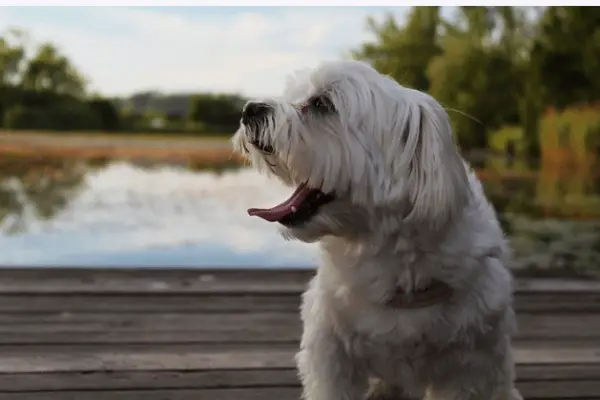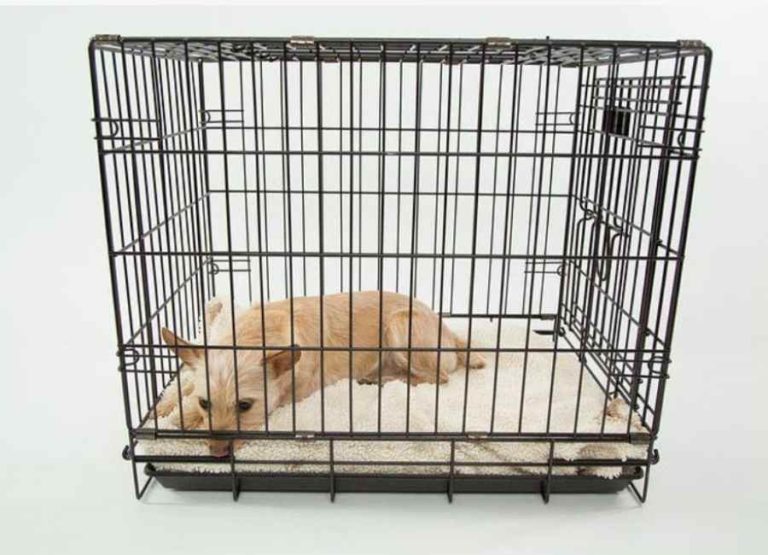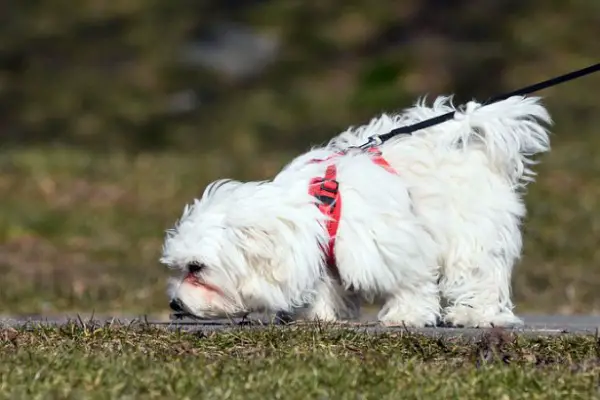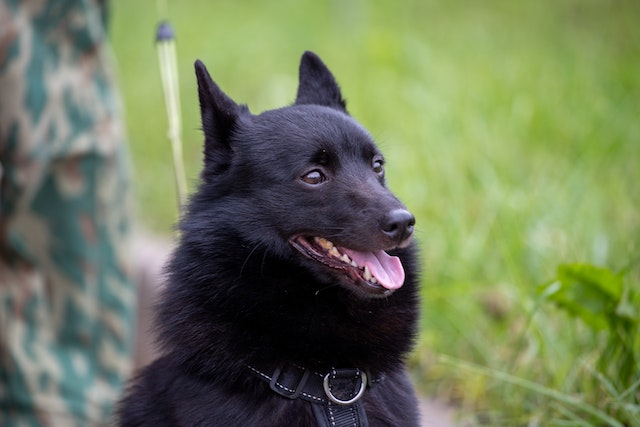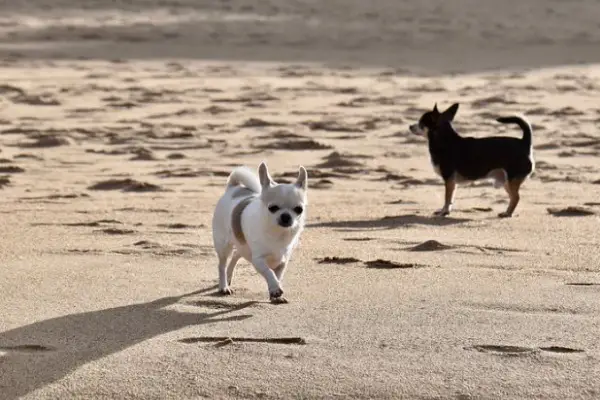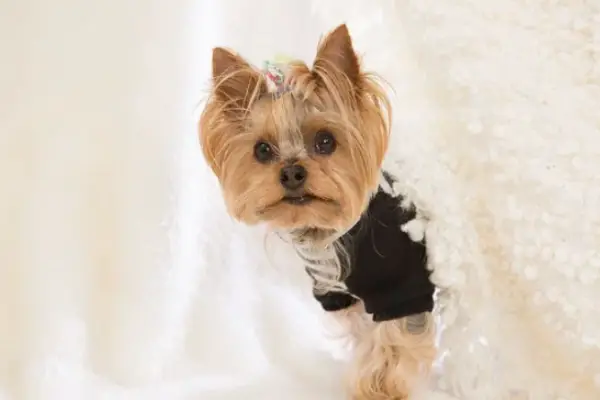8 Common Bichon Frise Behavior Problems & Hacks
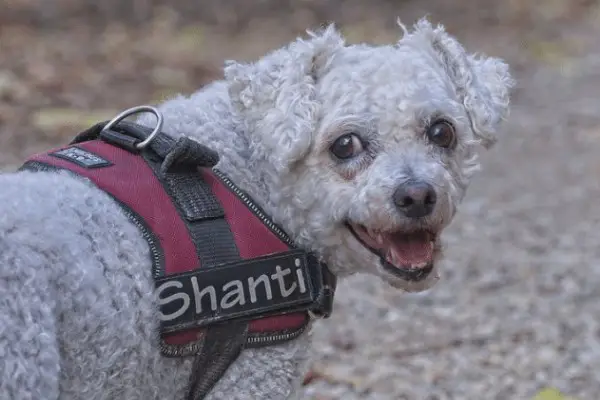
Bichon Frise behavior problems are exactly what we will be discussing all through this post, so sit back and learn more about Bichon Frise a cute and adorable small none sporting breed of dog.
We will be discussing all the most common Bichon Frise behavior problems you should know before getting one.
We will also discuss some common ways to solve these problems, so sit and read through.
Let me quickly give you a summary of some Bichon Frise behavior problems before we break it down.
Bichon Frise Behavior Problems
The Bichon Frise is a popular and lovely little dog breed, but it has a few behavioral issues, including begging, separation anxiety, excessive barking, chewing, and snapping.
The following are common Bichon Frise behavior issues to be aware of:
1. Bichon Frise is prone to separation anxiety
Separation anxiety in Bichon Frises occurs when the dogs are separated from their owners for a prolonged length of time or when they are not left alone unsupervised for an extended amount of time.
Separation anxiety in Bichon Frise can manifest itself in a variety of ways, including nipping, barking, self-isolation, injuries, and chewing.
Separation anxiety is caused by leaving a Bichon Frise alone at home, which may be avoided by giving a buddy or proper crate training.
Ways to prevent separation anxiety in Bichon Frise
The following are some typical methods for controlling or resolving separation anxiety in Bichon Frise:
- Make an appointment with a behaviorist for your pet.
- Consider hiring a dog sitter.
- Teach them to leave you alone at home and to keep a safe distance from you before you leave.
- Make a purchase of anti-anxiety products.
- As soon as possible, you should bring in a second pet.
- Make sure there are lots of fresh soft and fascinating toys to keep the puppy occupied.
- Allow plenty of time for rest, relaxation, and physical activity.
- Begin a new, appropriate crate training program for your dog.
- Talk to your vet for anxiety medication.
Read more: Bichon Frise Separation Anxiety (9 Signs, Causes & Hacks).
2. Bichon Frise are prone to begging
Before obtaining a Bichon Frise, you should be aware of one of the most typical Bichon Frise behavior issues such as begging.
Keep in mind that these small pups beg a lot, especially for food.
Bichon Frise, like the owner, has enticing looks that are impossible to ignore, eliciting requests.
Begging is a bad habit, but unfortunately, many dog owners promote it by feeding their pets while they eat.
Weight gain, stomach troubles, and even recurring diarrhea are all side consequences of succumbing to your Bichon Frise’s pleading.
The most basic way to avoid this annoying behavior is to never encourage it in the first place.
How to stop Bichon Frise from begging
Here are a few techniques to stop your Bichon Frise from begging:
- When your Bichon Frise is begging, don’t stare at him.
- When your Bichon Frise is begging, don’t talk to him.
- If your Bichon Frise attempts to jump on you while you’re begging, twist and turn away.
- Feed your Bichon Frise while also eating your meal.
- Teach your Bichon Frise to do anything other than begging for food at the table.
- While you dine, put your Bichon Frise in his room.
- When it’s time to dine, place the bowl near the table, so your Bichon Frise believes he’s dining with you.
- Teach your Bichon Frise that begging is a sign of negative conduct by using positive reinforcement.
3. Bichon Frise are prone to chewing when bored
Boredom, depression, worry, tension, and loneliness are the most common reasons for destructive chewing in Bichon Frise, all of which can be prompted by separation anxiety.
Something is amiss if your Bichon Frise is chewing everything he sees. It might be a sign of separation anxiety.
According to others, spray areas where you don’t want your Bichon Frise to chew or hide your valuables and electronic wiring.
You, on the other hand, are utterly clueless of your Bichon Frise’s needs.
Rather than spraying or masking the problem, why not figure out what’s causing the destructive nibbling and treat it once and for all.
Ways to stop chewing in Bichon Frise
Here are some common ways to control or fix destructive chewing in Bichon Frise;
- Allowing your Bichon Frise to become bored or lonely is never a good idea.
- Maintain constant engagement with your Bichon Frise.
- Buy chewing and interactive toys for your Bichon Frise.
- If your pup can’t stop eating, use furniture spray.
- More mental stimulation is necessary.
- Make sure your Bichon Frise is getting enough exercise.
- Dog-proofing your home is a great idea.
- If you want your Bichon Frise to remain away from your valuables, provide him with a chew toy.
4. Bichon Frise are difficult to house train
Housetraining is the act of educating a dog to poo outside or in a designated spot inside the house rather than following its natural instinct of pooping everywhere.
Housebreaking Bichon Frise is famously tough. Expect to spend two to three months training in sessions.
Bichon Frise might make mistakes even after you’ve completed toilet training. But once done expect to see a good dog.
One of the most prevalent Bichon Frise behavior issues is this. Try to pay attention to house training once you get a Bichon Frise.
Tips to help in house training a Bichon Frise
Here are some general guidelines for housebreaking a Bichon Frise:
- During housetraining, don’t overfeed your Bichon Frise.
- During the house-training process, don’t keep your Bichon Frise on a leash when you’re not around.
- Potty training a Bichon Frise should begin the day he or she arrives at your home.
- During the house-training process, provide your Bichon Frise a choice of areas to relieve himself.
- During the housetraining procedure, take your Bichon Frise to the restroom frequently before sleep.
- Do not yell or hit your Bichon Frise if he makes a mistake.
- During the house-training process, make no significant changes to your Bichon Frise’s regular routine.
- Throughout the housetraining process, feed your Bichon Frise at the same time and in the same manner.
- Make the toilet as accessible as possible during and after the housetraining process.
5. Unnecessary growling and barking
Growling and barking can be signs of anxiety or aggressiveness in little canines like Bichon Frise, especially when they’re near strangers.
A Bichon Frise with both of these features is prone to snarl at everyone who comes into contact with them.
Reduce their growling and barking to make them more approachable, acceptable, and less prone to injure people.
It may appear humorous or enjoyable at first, especially with little dogs like Bichon Frise, but it can irritate neighbors and create problems.
It’s not a good idea to encourage dogs to howl. Keep a close check on your dog to make sure he’s as quiet as possible.
Ways to control growling and barking in Bichon Frise
Here are some common ways to control or prevent excessive barking or growling in Bichon Frise;
- Avoid fear-inducing situations.
- The importance of early socialization cannot be overstated.
- Interaction between Bichon Frise and children should begin as soon as feasible.
- Teach your children how to pick up and handle Bichon Frise.
- Developing and keeping to a consistent daily regimen is critical.
- All sources of stress, tension, worry, and anxiety must be eliminated.
- Allow your Bichon Frise some alone time if he or she requests it.
- Please instill in your children the importance of respecting your Bichon Frise.
- There is a larger need for mental stimulation.
- Consult your Bichon Frise’s veterinarian for medical exams.
- Never leave your children alone with adult Bichon Frise that haven’t been socialized.
- Know when it’s appropriate to leave your Bichon Frise alone.
- You may strengthen your relationship with your Bichon Frise by playing with him and caring for him more.
- The significance of obedience training cannot be overstated.
6. Bichon Frise are prone to play aggression
One of the most well-known and well-known types of Bichon Frise behavior issues is play aggression.
Growling, snarling, lunging, and biting are just a few ways Bichon Frises demonstrate their play aggression.
They are often obsessed with chasing the ball or continues playing, without knowing when it’s time to stop.
It’s quite common in Bichon Frise since their owners always allow or encourage it because it’s the right thing to do.
Play aggression in Bichon Frises develops over time and, if untreated, can cause major difficulties with both your children and your dog.
Ways to prevent play aggression in Bichon Frise
Here are some pointers on how to keep a Bichon Frise’s play aggressiveness under control:
- Start by playing lightly with your Bichon Frise.
- Learn and educate your Bichon Frise how to regulate his or her exuberance.
- The socialization of your Bichon Frise should begin at a young age.
- Make arrangements to play with other pups and well-behaved adult dogs who can teach your puppy proper behavior.
- By neutering or spaying your Bichon Frise, you can reduce his hormone-driven hostility.
- Praise your Bichon Frise when he or she engages in pleasant play.
- Include a toy in the equation, and when a line is crossed, distract your Bichon Frise away from the game.
- If you have a boisterous Bichon Frise, stay off the floor.
- Teach compliance strategies and expectations.
- The only way to develop is through positive reinforcement.
7. Overly seeking attention
While this may be a problem for some, others may find it amusing to have their Bichon Frise follow them around the house demanding for affection.
When it comes to barking, biting, or nipping to get attention, Bichon Frise are no exception.
If you don’t want a cuddling dog or one who needs attention, a Bichon Frise is not for you.
Because Bichon Frise were intended to be companion dogs that spent their days with their people.
Helpful tips
- Create a system for them to follow, so they can acquire what they need without having to ask or while you are away.
- If you keep them busy with a variety of activities, they won’t follow you around like flies.
8. Chasing things
The excitement drive in Bichon Frises includes pursuing other animals, humans, and automobiles, as well as chasing moving objects.
Allowing your Bichon Frise to pursue humans, birds, or other dogs may be fatal.
Because the Bichon Frise dog was never built with a predatory nature, chasing is seldom an issue if properly taught.
Bichon Frise dogs enjoy playing tag with other Bichon Frise dogs, and it’s typically a fun activity until the pursuit takes place on a busy road, in which case it can become one of those dangerous dog behaviors.
You may not be able to stop your Bichon Frise from chasing you, but you may take precautions to avoid tragedy.
Ways to stop Bichon Frise from chasing things
Here are some ideas to keep your Bichon Frise from chasing after distractions:
- Early socialization is important in avoiding chasing things.
- Teach your Bichon Frise to obey the STOP command.
- Obedience training is very important.
- To keep your Bichon Frise from chasing after distractions, keep them on a leash or in a fenced-in yard.
- While out on a walk, don’t let your dog off the leash.
- Work with your Bichon Frise on impulse control and teaching them to come to you when you call.
- Socialization at a young age is advantageous.
- Teach your Bichon Frise to be calm around other dogs, cats, or pets.
- Seek the assistance of a dog behaviorist.
I hope with the information provided on this page you now understand Bichon Frise behavior problems and how to fix it!

